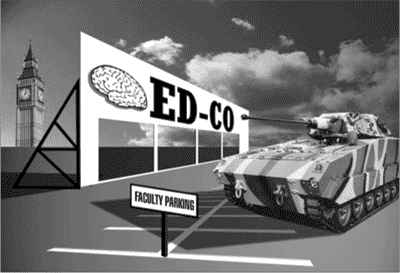Privatization, English Style
An Interview With Richard Hatcher By Bob Peterson

Richard Hatcher is a member of the education faculty at the University of Central England, Birmingham. He has been active in political and educational struggles for several decades. He has been a member of the Socialist Teachers’ Alliance, an influential group within the National Union of Teachers. Recently he has been involved in the education strand of the European Social Forums in Florence (2002) and Paris (2003). Hatcher is coordinating an education planning network for the European Social Forum in London in October 2004.
Rethinking Schools hopes to call attention to the way corporate globalism — called “neoliberalism” in many parts of the world — affects education. We also hope that this insider’s view of changes in the British educational system will move our readers to recognize the parallels and perils of privatization in both countries.
Rethinking Schools editor Bob Peterson interviewed Hatcher recently. The following are excerpts from a longer conversation.
RS: Could you describe what you see as the similarities and differences between K-12 education in Great Britain and the United States?
Hatcher: In many respects they are similar. Perhaps the most important difference is the degree of central government control in England. This has been a fairly recent change. For most of the last century, teachers had a fairly free hand in the schools to decide what to teach and how to teach it.
The national exam system, dictated by the universities’ entrance requirements, was the main factor that shaped what secondary schools did, but that only applied to the middle-class schools. Local Education Authorities (LEAs), which are similar to your local school districts and boards, provided an infrastructure of support and funding.
Then came the Thatcher government’s 1988 Education Act.
RS: What was the result of that Act?
Hatcher: It did two things: First, it decentralized power from LEAs, which were mostly controlled by the Labour Party, and transferred power to individual schools through school-based management, in effect creating a quasi-market system with each school operating on its own.
Second, the Act greatly increased the power of central government over what the schools did. The three key instruments were a rather prescriptive National Curriculum, which we had never had before; regular national tests at age seven and 11, with published results of the tests at age 11 and the national exam at age 16; and the transformation of the system of national inspections of schools into a punitive apparatus of control.
RS: Have things changed since the Labour Party took control of the national government in 1997?
Hatcher: Labour has retained all of these policies and, in fact, strengthened them by adding additional initiatives: It added the extremely prescriptive National Literacy and Numeracy Strategies to the National Curriculum, first in primary schools; now the literacy one extends to secondary schools. There are also national tests required at age 14. Each school is supposed to reach pupil attainment targets against which they are measured and inspected— similar, I believe, to the “adequate yearly progress” targets of Bush’s No Child Left Behind Act. And we now have merit pay for teachers.
RS: What’s the historical basis for some of these changes?
Hatcher: The main thread running through the history of English education is class division. A key moment was the adoption of the comprehensive school in the 1960s (much later than in the United States). The large majority of secondary schools are now comprehensive, though the elite private schools (confusingly called public schools) still remain for the rich; and some selective grammar schools still survive. But it soon became clear that even if all students were under the same roof, the comprehensive school still tended to reproduce patterns of class inequality.
Beginning in the 1960s large numbers of children of immigrants from the Caribbean and the Asian subcontinent began arriving in the schools. The school system was failing to meet the needs of those students, in particular those from the Caribbean, Pakistan, and Bangladesh. This is still the case today, decades later. In fact, these inequality gaps have become wider. (The only one which has narrowed is between girls and boys.)
RS: What do you see as the reasons for those widening gaps?
Hatcher: Social inequality in the United Kingdom has widened as a result of the policies of the Thatcher government. And seven years of New Labour have made little difference. Other factors are within education. The Thatcher government created a quasi-market of parental choice and competition among schools. This benefited middle-class families at the expense of the poor. This has continued under Labour, but the Labour government has added to the problem by encouraging different types of schools, which has again tended to increase social inequalities in education.
RS: Can you give an example of social class bias in schools?
Hatcher: At one extreme, lower-achieving pupils are now allowed to follow a diluted and work-related curriculum from age 14. At the other, there is fast tracking to academic qualifications for the “more able” pupils, and special programs for the 5-10 percent of pupils designated “gifted and talented,” including the Academy for Gifted and Talented Youth.
Class differentiation will be reinforced by the proposal in the government’s recent proposal to end the National Curriculum at age 14. After that point, foreign languages and the humanities (including history and the arts) would be optional. It is mainly schools in working-class areas that will abandon teaching modern languages, while they remain an indicator of academic success in middle-class schools.
RS: Why has the Labour government pushed pro-market reforms as much or even more than the Conservatives?
Hatcher: The Labour government argues that the involvement of the private sector in the British school system is necessary in order to overcome the conservative and bureaucratic resistance of teachers and local authorities. Almost every major government policy initiative has relied on private companies to translate it into practice. Private companies have been used to spearhead the transformation of the role of teachers by devising and administering the merit pay system. Private companies have provided the training for teachers in new curriculum initiatives such as the National Literacy and Numeracy Strategies and the National Grid for Learning, which links schools to the Internet. And private companies play a key role in imposing a regime of performance measurement and punishing schools that fall short, through the regular inspections of schools. Inspections used to be carried out by government officials and now are mostly contracted out to private for-profit companies. Labour also sees private investment as a way of reducing state spending on education. And Labour wants to foster the development of a strong British education industry as a major player in the global neo-liberal services economy, which is developing today and for which the General Agreement on Trade in Services (GATS) is designed to create the legislative framework. For example, Serco, a British multinational that manages military facilities for NATO countries — and also the British Early Warning Missile system — now provides the services of LEAs in two cities, runs training programs for teachers and school principals, and carries out several hundred school inspections each year. That shows how profitable the education market is becoming.
RS: Has Labour outright privatized schools as it has sold off other areas of the public sector?
Hatcher: No, mainly because it’s a politically risky step. But it has gone halfway with two new policies. One is the Private Finance Initiative, which is a way of financing new schools and refurbishing existing ones. A consortium of companies provides the money and the LEA pays them back over a period of 25 to 30 years. During this time the schools — except for the teachers — are owned and run by the consortium. But education-for-profit companies are demanding that they should employ the teachers too.
The other new policy is “Academies.” These are new secondary schools sponsored by business. Sponsors are required to pay 20 percent of the capital costs of the school, around $3 million, and the government provides funding of up to $30 million. In return, the sponsor can appoint a majority of the school governing body — and through it, the teachers. Ownership of the land and buildings of the existing state school, currently the property of the local council, is transferred to the new Academy, so in effect sponsors are being handed a school at one-fifth of its value. Labour’s aim is one in every town.
At present, Academies cannot be run for profit. In some cases the motivation is the opportunity for a sponsor to put an ideological commitment into practice. For example, the Bexley Business Academy in London, which celebrates the virtues of the market, is sponsored by a multi-millionaire property developer. Two other academies are sponsored by the owner of a chain of car dealers, who uses the schools to promulgate his fundamentalist Christian belief in creationism as a valid alternative to evolutionary theory. A more down-to-earth motive underlies the academy sponsored by Amey, a large civil engineering and facilities management company, which is using it as a test-bed for future opportunities to run schools for profit. But the logic of Labour’s policies is that sooner or later private companies will be permitted to run academies for profit, similar to some charter schools in the United States.
RS: That’s remarkable. Are there other ways the Labour government promotes a market approach to education?
Hatcher: Labour has also promoted competition through decentralization which means parents act as consumers choosing among competing schools. Their argument is that decentralization is both more efficient and more democratic because it enables schools to change more rapidly, to respond to the specific needs of local communities, and to be more locally accountable. It can also have the advantage of deflecting criticism of education policy (for example, of the level of funding) away from central government.
RS: In the United States, schools are being pushed to act like private entrepreneurial entities. Is that also the case in Britain?
Hatcher: Yes, the Blair government is encouraging LEAs and schools to behave like private companies. It’s not just the adoption of business management methods, it’s LEAs selling their services to schools. And our schools are driven by parental choice and published test scores to compete with each other. The latest development is the 2002 Education Act, which provides the legislative framework to encourage commercial activities by schools themselves. It empowers school governing bodies to form, become a member of, or invest in companies to purchase or provide services and facilities to schools and communities. The aim is to create an education market in which entrepreneurial schools will sell educational goods and services. Teaching can be turned into a commodity in the form of curriculum materials and entire lessons online. The model is Thomas Telford Secondary School in Shropshire, which has made a staggering $10 million profit in just over two years by selling its examination courses online to other schools.

RS: What are the consequences of this move toward privatization?
Hatcher: It is too early to assess the effects of various forms of privatization on education in terms of, for example, curriculum and teaching methods. But there are certainly four areas where the impact is beginning to be visible.
The first area is in the area of efficiency. Efforts at privatization are proving less efficient than government projects. Despite what privatization’s proponents say, education-for-profit PFI companies are less efficient because it is more expensive for them to borrow from the banks than from the government. On top of that, there are fees for consultants and the profit taken by the companies. When these entities do cut costs, they achieve it by cutting the number of employees and employing new workers at lower rates of pay.
The second area is the growing privatization of professional knowledge. Many of the companies moving into the education market have no professional expertise in education, so they buy it from the public sector. Education-for-profit companies now employ thousands of ex-LEA and ex-school staff. In effect, they are buying the professional knowledge created within the school system and then selling it back at a profit. Meanwhile the professional creativity of teachers in the schools is straitjacketed by a narrow curriculum, targets, tests, and underfunding. The ability of LEAs to provide professional support to schools is being starved by lack of funds.
School privatization has also had a negative impact on democracy. The interests of private companies in education conflict with those of local democracy in a number of ways. For example, the government disregards local public opinion when it comes to the handing over of LEA services to private companies. Nevertheless, private companies resent the constraints imposed by elected local officials. At school level, business tends to seek majority control. Private companies are given a controlling majority on Academy governing bodies, at the expense of parent and LEA representatives. A further issue is that of transparency. Local authorities are bound by legislation to give the public access to certain information. Private companies are not bound by the same legislation, and can appeal to “commercial secrecy” to withhold information from the public
There is a fundamental conflict between market principles and citizenship rights. If the state is no longer directly responsible for the operation of services, there is no direct link between the user, or citizen, and the provider. While the ability of citizens to influence policy is reduced, the ability of companies to do so is facilitated by permanent lobbying of decision-makers. It is no accident that most of the big companies now moving into education (and swallowing up the small education businesses) are in defense and construction, where skills of lobbying and close personal links with politicians and top officials are the name of the game.
And finally, privatization could have an impact on the employment of teachers. The companies that want to
run state schools want to change the law so that they employ teachers, instead of the school’s governing body. Opposition from the teachers’ unions has so far prevented the government from acceding to this demand.
RS: How have the teacher unions responded to both the crisis in providing adequate education to all groups of people and the attack by the right in favor of privatization?
Hatcher: In England and Wales we have five unions for teachers and principals. The key one is the National Union of Teachers (NUT), because it is the largest and because it is the most progressive in its policies. The NUT has quite a good record in taking up equality issues, partly because of pressure from the left. It also verbally opposes privatization, but refuses to take action against it unless members are at risk, which has generally not been the case so far. That is why the proposed boycott of SATs— the national tests— was so significant, because it is the first time the union proposed industrial action over educational— rather than pay and conditions— issues. Unfortunately the vote didn’t pass, even though of those who voted, 86 percent (30,000 teachers) voted for a boycott. But only 34 percent of the members voted, and the union rules require 50 percent to vote before the strike fund can be used to support an action. The campaign will continue, but largely at a propaganda level. Basically it shows that teachers, like most of the rest of the trade union movement, are not yet ready to take action against the government.
Despite this vote, it’s my hope that the growing opposition to privatization in the trade union movement as a whole, galvanized by the latest step towards the semi-privatization of some hospitals, will provide a more favorable climate to take up the issue in education.
It’s clear that similar education policies are being carried out in the United States, the United Kingdom, and worldwide. One important recent development is the beginning of a network of activists across Europe, arising out of the annual European Social Forums, which have attracted around 50,000 people. We’re busy now jointly planning education sessions for the ESF in London in October. We would welcome any participants from Rethinking Schools.

